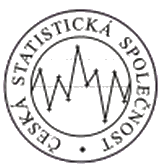Venue
Czech Statistical Office, Na padesátém 81, Prague 10 (November 10)
Czech Technical University, Faculty of Mechanical Engineering, Karlovo nám. 13, Prague 2 (November 11)
Program
The following invited speakers will speak at the Friday program in the Czech Statistical Office
(names in alphabetical order, affiliation and title of contribution).
| Book of Abstracts in pdf | Program in pdf |
Jaromír Antoch
Charles University in Prague,
Faculty of Mathematics and Physics
Vítězslav Benda
Czech Technical University,
Faculty of Electrical Engineering
Eliška Cézová
Czech Technical University,
Faculty of Mechanical Engineering
Jakub Dostál
Palacký University of Olomouc,
Faculty of Science
Zdeněk Fabián
Academy of Sciences of Czech Republic,
Institute of Informatics
Antonín Fejfar
Academy of Sciences of Czech Republic,
Institute of Physics
Pavel Janeček
Pražská plynárenská,
former CEO
Miloš Kopa, Karel Kozmík
Charles University in Prague,
Faculty of Mathematics and Physics
Frank Lenzmann
Energy reasearch center of Netherlands (ECN)
Lubomír Lízal
Czech Technical University,
Faculty of Electrical Engineering
Ondřej Mamula
Czech Institute of Informatics, Robotics and Cybernetics
Emil Pelikán
Academy of Sciences of Czech Republic,
Institute of Informatics
Florian Sobieczky
Software Competence Center Hagenberg GmbH, Austria
Vladimír Wágner
Academy of Sciences of Czech Republic,
Institute of Nuclear Physics
Saturday's program in the building of the Czech Technical University on Charles Place (Karlovo náměstí 13) is devoted to round table discussion.
Call for Abstracts
All participants are invited to submit a short abstract of their contribution.
The deadline for abstract submission is November 1, 2023.
Organisers
The workshop and round table are supported by the Czech Academy of Sciences within the framework of the research program Strategie AV21, Czech Technical University in Prague, Charles University in Prague, Czech Statistical Office,and Czech Statistical Society
Scientific program committee:
Jaromír Antoch
Charles University in Prague
Hynek Beran
Czech Technical University in Prague
Gejza Dohnal
Czech Technical University in Prague
Katerina Newell
Amsterdam University College
Emil Pelikán
Czech Academy of Sciences
Organizing committee:
Jaromír Antoch
Charles University in Prague
Lucie Bartoňová
Prague
Eliška Cézová
Czech Technical University in Prague
Gejza Dohnal
Czech Technical University in Prague
Emil Pelikán
Czech Academy of Sciences
contact email:
info@energy-workshop.cz


